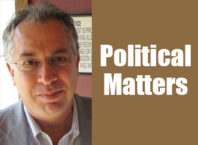House panel nixes nukes
When I worked for the Minnesota House of Representatives’ Public Information Office in the mid-90s, I got a front-row view of state lawmaking. One of the big issues in 1994 was nuclear waste storage at Prairie Island. Northern States Power Co. (now Xcel Energy) went to the Legislature for permission to expand its on-site nuclear waste storage at the twin reactors.
Following a protracted wrangle and many late night conference committee sessions, NSP ultimately got its way with the Legislature, which approved the construction of a spent fuel storage facility comprised of 17 massive steel casks, in the parking lot of the Prairie Island plant – a stone’s throw from the Prairie Island Mdewakanton Dakota community and the Mississippi River.
The nation’s nuclear power industry still has no solution to the problem of storing highly radioactive nuclear garbage; more than 57,000 tons of spent nuclear fuel is now being stored adjacent to nuclear power plants around the country. The federally designated burial site for nuke waste at Yucca Mountain in Nevada has been plagued by technical problems and political controversy. Nevada’s Senator Harry Reid, the U.S. Senate majority leader, opposes construction of a federal waste dump in his state, and the Obama administration has not included money for Yucca Mountain in its budget proposal.
Although nobody wants to live next to a nuclear power plant, there are
some voices calling for a resurgence of nuclear energy generation – as
an answer to the problem of global warming. However, the pro-nukes
forces in Minnesota were dealt a setback on March 27, when the House
Energy Policy and Finance Division rejected a bill to undo the state’s
ban on new nuclear power plants. The 12-9 vote against the measure
brought by St. Paul DFL Rep. Tim Mahoney followed seven hours of pro
and con testimony.
Removal of the 15-year-old moratorium will not occur this year, Sen.
Steve Murphy, DFL-Red Wing, told the Grand Forks Herald. Murphy, who
championed the 1994 Prairie Island nuclear waste storage proposal,
withdrew his Senate bill to end the state’s ban on nukes. “Nobody’s
clamoring to build nuclear power plants,” he said.
Shills for the nuclear power industry will be pressing their case for
the rebirth of nuclear power, which exists thanks to massive U.S.
government subsidies and the
Price-Anderson Act (expiration date: 2025), which limits the monetary
liability of utilities in the event of a massive nuclear disaster.
Thirty years after the accident at the Three Mile Island plant in
Pennsylvania, which effectively ended the construction of new reactors,
the uranium/nuke power consortium is on the offensive.
RNC aftermath-Part 3
Since my son Max, who turned 20 in March, was branded as a domestic
terrorist by the authorities, in the aftermath of the protests at the
Republican National Convention (RNC), I have been closely following the
prosecution of protesters by Ramsey County and the city of St. Paul.
After putting 10 individuals on trial, the St. Paul city attorney
finally got a conviction on one misdemeanor count in March; a fine of
$50 was levied. Congratulations!
The stakes are higher for the group known as the “RNC 8,” the local
political activists charged with “conspiracy to riot in furtherance of
terrorism” and three other related felony counts. I am happy to report
that community support is growing to support Max and his seven
codefendants, who each face 15 years in prison for their political
organizing. At the same time, the Minneapolis Police Department is
ramping up its intimidation tactics, which will come as no surprise to
members of the local Indian community.
On the morning of March 28, the RNC 8 Defense Committee’s “Tour de
Fletcher” bicycle ride visited the three south Minneapolis houses that
were raided early on the morning of Aug. 30, two days before the RNC
convened, by SWAT teams under the direction of Ramsey County Sheriff
Bob Fletcher. The 38 riders left Powderhorn Park on the Saturday
morning accompanied by two police vans, a black-and-white squad car, an
unmarked squad car, and four cops on bicycles. Near the Midtown
Greenway, the cops nabbed one rider who strayed from the pack. He was
charged with “disorderly conduct” and bailed out later in the day.
The overly large police presence on March 28 was a waste of city
resources; it also continues the shameful tradition of police
over-reaction that we saw during the RNC in St. Paul. We need more
public support for the RNC 8 to send a clear message: dissent is not a
crime.




